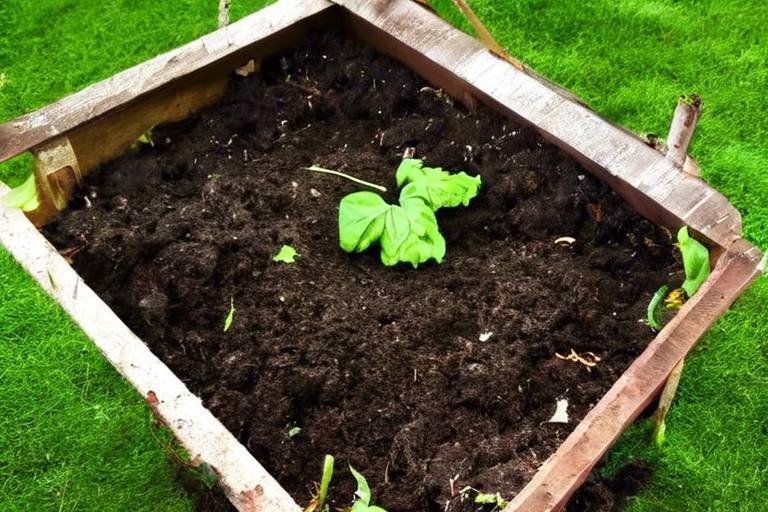10 Ways to Get Involved in Local Environmental Initiatives
Are you looking to make a positive impact on the environment right in your own community? There are numerous ways you can get involved in local environmental initiatives that not only benefit the ecosystem but also promote sustainability. By taking action at a grassroots level, you can contribute to a cleaner, greener future for everyone. Let's explore 10 impactful ways you can engage in environmental activities within your local area.
One effective way to contribute to a cleaner environment is by joining community clean-up events. These organized efforts allow you to remove litter and waste from local parks, beaches, and streets, helping to beautify the surroundings and protect wildlife from harmful debris. By participating in clean-up events, you can directly see the impact of your actions on the local ecosystem.
If you have a passion for conservation, consider volunteering at a local organization dedicated to protecting natural habitats and wildlife. By offering your time and skills, you can support important conservation efforts in your area and help preserve biodiversity for future generations. Whether it's assisting with habitat restoration projects or wildlife monitoring, your contribution can make a significant difference.
For those looking to deepen their understanding of environmental issues, attending workshops and seminars is a great way to gain knowledge and insights. These educational opportunities cover topics such as sustainable practices, ecological conservation, and ways to reduce your carbon footprint. By learning from experts in the field, you can become a more informed advocate for environmental stewardship.
Another hands-on way to get involved is by starting or joining a community garden. By engaging in urban agriculture, you not only promote local food production but also create green spaces that benefit both people and the environment. Community gardens foster a sense of community spirit and provide opportunities for individuals to connect with nature in urban settings.
Advocacy plays a crucial role in driving sustainable change, and you can be a part of it by supporting policies that prioritize environmental protection. Get involved in local advocacy efforts that promote renewable energy, waste reduction, and sustainable practices. By advocating for green policies, you can help shape a more eco-friendly future for your community.
Initiating a recycling drive in your neighborhood is a practical way to reduce waste and promote recycling habits among residents. By collecting and properly disposing of recyclable materials, you can divert waste from landfills and contribute to a more circular economy. Encouraging others to recycle can have a ripple effect, leading to a cleaner environment for all.
Joining tree planting initiatives is a powerful way to enhance greenery in urban areas and combat climate change. Trees play a vital role in improving air quality, providing habitat for wildlife, and beautifying the surroundings. By participating in tree planting events, you can contribute to a healthier ecosystem and create lasting benefits for your community.
Supporting local farmers markets is not only a way to access fresh, locally grown produce but also a way to promote sustainable agriculture practices. By shopping at farmers markets, you support small-scale farmers and help reduce the carbon footprint associated with food transportation. Additionally, farmers markets foster a sense of community and connection with the sources of your food.
Engaging in environmental advocacy campaigns allows you to be part of movements that drive positive change in your community. Whether it's raising awareness about environmental issues, influencing policy decisions, or mobilizing grassroots support, advocacy campaigns are instrumental in creating a more sustainable future. By lending your voice to these campaigns, you can be a catalyst for meaningful environmental action.

Join a Community Clean-Up Event
Joining a Community Clean-Up Event is a fantastic way to actively contribute to the cleanliness and health of your local environment. By participating in organized clean-up efforts, you not only help in removing litter and waste from parks, beaches, and streets but also foster a sense of community and environmental stewardship among participants. These events provide an opportunity to witness the immediate impact of your actions and see the tangible results of a cleaner environment.
During a community clean-up event, individuals of all ages and backgrounds come together with a shared goal of beautifying their surroundings and protecting wildlife from the dangers of pollution. It's a chance to connect with like-minded individuals, share experiences, and inspire others to take responsibility for their environment. The power of collective action in these events is akin to a symphony orchestra playing in harmony, each person playing a crucial role in creating a masterpiece of cleanliness and sustainability.
Furthermore, participating in clean-up events can be a learning experience, raising awareness about the impact of waste on ecosystems and the importance of proper waste disposal. It educates individuals on the need for responsible consumption and waste management practices, encouraging them to rethink their habits and strive for a more sustainable lifestyle. Like a ripple effect in a pond, the actions taken during a clean-up event can create lasting effects that extend far beyond the day of the event.
By joining a community clean-up event, you not only contribute to the immediate improvement of your local environment but also set an example for others to follow. Your participation sends a powerful message that small actions can lead to significant change, inspiring others to take initiative and become stewards of the environment. Together, individuals can transform their communities into cleaner, healthier, and more sustainable places for current and future generations to enjoy.

Volunteer at a Local Conservation Organization
Exploring various ways individuals can engage in environmental activities within their community to make a positive impact on the local ecosystem and promote sustainability.
When you volunteer at a local conservation organization, you are dedicating your time and effort to protecting the natural world right in your own backyard. By working with these organizations, you can contribute to vital conservation efforts that safeguard ecosystems, preserve wildlife habitats, and promote biodiversity.
Imagine being part of a team that is actively involved in restoring local wetlands, monitoring endangered species, or educating the community about environmental issues. Your involvement can create a ripple effect, inspiring others to take action and fostering a sense of stewardship towards the environment.
Through volunteering, you not only gain hands-on experience in conservation work but also forge connections with like-minded individuals who share your passion for protecting the planet. Whether you are assisting with research projects, organizing outreach events, or participating in habitat restoration activities, your contribution can make a tangible difference in the health and resilience of your local environment.
If you have a specific skill set, such as photography, graphic design, or data analysis, you can offer these talents to support the organization's communication efforts or scientific research. Every contribution, no matter how small it may seem, plays a part in the larger mission of conservation and environmental stewardship.
Volunteering at a local conservation organization is not just about giving back to nature; it is also a rewarding experience that allows you to learn, grow, and be part of a community dedicated to making a positive impact on the world around us.

Attend Environmental Education Workshops
When it comes to expanding your knowledge and understanding of environmental issues, attending environmental education workshops can be a valuable experience. These workshops provide a platform for individuals to delve deeper into topics such as sustainable practices, conservation efforts, and the importance of biodiversity. By participating in these educational sessions, you not only gain insights into current environmental challenges but also learn practical ways to make a positive impact in your community.
Environmental education workshops often feature expert speakers, interactive activities, and discussions that encourage participants to think critically about their role in preserving the environment. Through engaging presentations and hands-on learning opportunities, attendees can explore innovative solutions to environmental problems and discover how small actions can lead to significant changes.
Moreover, these workshops offer a chance to connect with like-minded individuals who share a passion for environmental conservation. By networking with fellow participants, you can exchange ideas, collaborate on eco-friendly projects, and build a strong community of environmental advocates dedicated to creating a sustainable future.
One of the key benefits of attending environmental education workshops is the opportunity to gain practical skills that can be applied in everyday life. Whether it's learning about composting techniques, water conservation methods, or energy-efficient practices, these workshops empower individuals to adopt eco-conscious behaviors and reduce their environmental impact.
Additionally, environmental education workshops can inspire and motivate individuals to become agents of change in their communities. By educating yourself on pressing environmental issues and sharing your knowledge with others, you can raise awareness, spark conversations, and mobilize collective action towards a greener and more sustainable world.

Start or Join a Community Garden
When it comes to making a tangible impact on the environment right in your own community, starting or joining a community garden can be a powerful way to promote sustainability and foster a sense of local camaraderie. Community gardens serve as green oases in urban landscapes, offering spaces for growing fresh produce, cultivating flowers, and providing a sanctuary for both people and wildlife.
By participating in a community garden, you not only contribute to the beautification of your neighborhood but also play a role in promoting local food production and reducing the carbon footprint associated with transporting goods over long distances. These gardens are not just about planting seeds; they are about nurturing connections with nature and fellow community members, fostering a sense of shared responsibility for the environment.
Imagine a patch of land transformed into a vibrant tapestry of colors and textures, buzzing with the gentle hum of bees and the flutter of butterflies. Community gardens are not just about growing plants; they are about cultivating a sense of belonging and stewardship among individuals who come together to tend to the earth and reap the rewards of their collective efforts.
Furthermore, community gardens provide valuable educational opportunities for both adults and children, offering hands-on experiences in gardening, composting, and sustainable practices. These spaces serve as outdoor classrooms where individuals can learn about the importance of biodiversity, the benefits of organic gardening, and the interconnectedness of all living beings.
Joining or starting a community garden is not just about planting seeds in the ground; it is about sowing the seeds of environmental awareness and community empowerment. It is a way to transform vacant lots into vibrant green spaces, to turn strangers into neighbors, and to cultivate a sense of shared responsibility for the well-being of the planet we all call home.

Advocate for Sustainable Policies
Advocating for sustainable policies is a powerful way to make a lasting impact on the environment in your community. By actively supporting initiatives that promote sustainability, renewable energy, waste reduction, and environmental protection, you can contribute to creating a greener and healthier future for all.
When advocating for sustainable policies, it's essential to stay informed about local environmental issues and proposed legislation. Engaging with policymakers, attending town hall meetings, and voicing your concerns can help shape decisions that prioritize the well-being of the environment and the community.
Collaborating with like-minded individuals and organizations can amplify your advocacy efforts. By joining forces with environmental groups, community associations, and grassroots movements, you can work together towards common goals and create a stronger voice for change.
Utilizing social media and online platforms can also be a powerful tool for advocating for sustainable policies. Sharing information, raising awareness about environmental issues, and mobilizing support online can help reach a wider audience and generate momentum for positive change.
Additionally, educating yourself about the economic and social benefits of sustainable practices can strengthen your advocacy arguments. Highlighting the positive impacts of green initiatives on public health, job creation, and overall quality of life can sway opinions and garner support for sustainable policies.
Remember, advocacy is a continuous process that requires dedication, persistence, and collaboration. By actively engaging in advocacy campaigns and promoting sustainable policies, you can play a vital role in shaping a more environmentally conscious and sustainable future for your community.

Organize a Recycling Drive
Organizing a recycling drive in your community can have a significant impact on promoting sustainable waste management practices and encouraging recycling habits among residents. By initiating a recycling drive, you can actively engage your neighbors in environmental conservation efforts and contribute to reducing the amount of waste that ends up in landfills or pollutes the environment.
One effective way to organize a successful recycling drive is to collaborate with local schools, community centers, or businesses to raise awareness and encourage participation. By partnering with these organizations, you can reach a wider audience and mobilize more people to collect and recycle their household waste.
Creating a designated drop-off point for recyclable materials, such as paper, plastic, glass, and metal, can streamline the collection process and make it convenient for participants to dispose of their items. Providing clear guidelines on what can be recycled and how to prepare the materials for collection can help ensure the success of the recycling drive.
Utilizing social media platforms, local newspapers, and community bulletin boards to promote the recycling drive can help spread the word and attract more participants. Sharing information about the environmental benefits of recycling and the importance of reducing waste can inspire individuals to take action and participate in the initiative.
Offering incentives or rewards for those who actively participate in the recycling drive, such as discounts at local businesses or eco-friendly products, can motivate individuals to get involved and contribute to the success of the initiative. Recognizing and appreciating the efforts of participants can also foster a sense of community spirit and encourage continued engagement in environmental activities.
Collaborating with local recycling facilities or waste management companies to ensure that the collected materials are properly sorted, processed, and recycled in an environmentally responsible manner is essential. By establishing partnerships with these organizations, you can ensure that the recycling drive has a positive impact and contributes to sustainable waste management practices in your community.

Participate in Tree Planting Initiatives
Exploring various ways individuals can engage in environmental activities within their community to make a positive impact on the local ecosystem and promote sustainability.
When you participate in tree planting initiatives, you are not just planting a tree; you are sowing the seeds of a greener future for your community. Trees play a crucial role in combating climate change by absorbing carbon dioxide, providing oxygen, and creating a healthier environment for all living beings. By joining tree planting events, you contribute to increasing greenery in urban areas, improving air quality, and creating habitats for wildlife.

Support Local Farmers Markets
Exploring various ways individuals can engage in environmental activities within their community to make a positive impact on the local ecosystem and promote sustainability.
Supporting local farmers markets is not just about buying fresh produce; it's a way to connect with your community and contribute to sustainable agriculture. By shopping at farmers markets, you are supporting local farmers and promoting environmentally friendly practices. These markets offer a variety of fresh, locally grown fruits, vegetables, and other products that are often organic and free from harmful pesticides. Additionally, you can reduce your carbon footprint by purchasing food that hasn't traveled long distances to reach your plate.
When you support local farmers markets, you are investing in the local economy and helping to preserve farmland in your area. By choosing to buy from local producers, you are encouraging the growth of small-scale agriculture and ensuring that traditional farming methods are maintained. Farmers markets also provide an opportunity to learn about where your food comes from, how it is grown, and the people behind its production.
Moreover, shopping at farmers markets can be a social experience, allowing you to interact with farmers, artisans, and other members of the community. You can ask questions, sample products, and engage in conversations about sustainable farming practices and the importance of supporting local agriculture. By fostering these connections, you become a part of a network that values environmental stewardship and community resilience.
In addition to fresh produce, farmers markets often feature a variety of homemade goods, baked items, flowers, and artisanal products. By purchasing these items, you are supporting local entrepreneurs and artisans, contributing to the diversity and vibrancy of your community. Farmers markets are not just places to buy food; they are hubs of creativity, culture, and sustainability.
When you choose to support local farmers markets, you are making a conscious decision to prioritize sustainability, community engagement, and environmental stewardship. Your actions have a ripple effect, influencing the local economy, promoting healthy food choices, and fostering a sense of belonging within your community. So next time you need groceries, consider visiting a farmers market and experience the benefits of supporting local agriculture firsthand.

Engage in Environmental Advocacy Campaigns
Engaging in environmental advocacy campaigns is a powerful way to make a difference in your community and beyond. By participating in advocacy efforts, you can amplify your voice and contribute to shaping policies that prioritize sustainability and environmental protection. These campaigns often involve raising awareness about pressing environmental issues, mobilizing support for specific causes, and influencing decision-makers to take action.
One effective way to engage in environmental advocacy campaigns is to join local grassroots movements that focus on specific environmental issues. These groups often organize events, rallies, and petition drives to raise awareness and push for policy changes at the local and regional levels. By getting involved, you can connect with like-minded individuals, share ideas, and work together towards common goals.
Advocacy campaigns also provide opportunities to collaborate with environmental organizations, non-profits, and community groups that are dedicated to protecting the environment. By volunteering your time and skills, you can support these organizations in their advocacy efforts, whether it's through outreach, research, or event planning. Your contribution can help amplify the impact of these campaigns and bring about positive change.
Additionally, engaging in environmental advocacy campaigns allows you to use your voice to advocate for sustainable practices and policies in your community. Whether it's advocating for renewable energy initiatives, waste reduction programs, or green infrastructure projects, your involvement can help influence decision-makers and promote a more sustainable future for all.
Remember, environmental advocacy is not just about raising awareness—it's about taking action and driving meaningful change. By participating in advocacy campaigns, you can be a powerful force for environmental progress and contribute to building a more sustainable and resilient world for future generations.
Frequently Asked Questions
- How can I get involved in local environmental initiatives if I have a busy schedule?
There are various ways to contribute to environmental causes even with a busy schedule. You can participate in weekend clean-up events, attend evening workshops, or support local farmers markets on your way home from work. Every small effort counts towards making a positive impact on the environment.
- What skills do I need to volunteer at a local conservation organization?
Most conservation organizations welcome volunteers with a passion for nature and wildlife, regardless of their specific skills. Whether you are good at organizing events, communicating with others, or simply willing to lend a helping hand, there is a role for everyone in supporting conservation efforts.
- How can I convince my community to start a community garden?
Organizing a community meeting to discuss the benefits of a community garden, such as promoting local food production, fostering a sense of community, and creating green spaces, can be a great way to garner support. You can also reach out to local authorities or environmental groups for guidance on starting a community garden in your area.



















